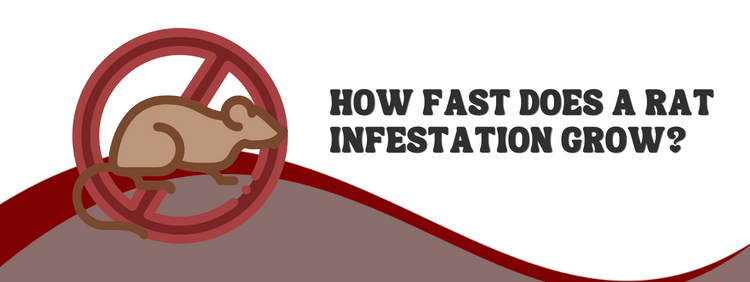 Rats are one of the most fear-inducing and off-putting rodents to see in or near your home. If you see a rat, do not wait to call for professional pest control in York Region. It will be well worth your time and money to deal with this problem. What can start with only two rats could become dozens in just a few months.
Rats are one of the most fear-inducing and off-putting rodents to see in or near your home. If you see a rat, do not wait to call for professional pest control in York Region. It will be well worth your time and money to deal with this problem. What can start with only two rats could become dozens in just a few months.
Why Is It Important To Call for Immediate Removal?
A mother rat can have babies approximately five times a year. This means that once a rat builds a nest for the purpose of having babies, those babies will be born within three months. A litter of rat pups could be as large as 14 babies, and those babies can start mating and having their own babies in just five weeks. Time is not on your side! Keep in mind that seeing a rat for the first time does not mean it just arrived. You really don't know how long it has been nesting. In addition, once a rat has found a cozy place to eat, sleep, and hide, other rats may be attracted or enticed to live there as well.Rats Can Cause Serious, Expensive Damage
Rats are notorious for chewing constantly. One bizarre fact is that their teeth never stop growing, which is why they always want something to gnaw on. If they do not file their teeth down, the long teeth will become painful and impact their ability to eat. Because of this evolutionary oddity, rats will chew, not just to build their nests out of paper and wood, but also to remove any barriers to their progress, such as electrical wiring. When a rat chews through a wire, the electricity still arcs across the new gap between the frayed edges. This can easily cause sparks that will land on the dry wood or cardboard of your attic and cause fires. Fire marshalls have sometimes concluded that even though the cause of the fire was undetermined, it likely could have been caused by sparks from a wire chewed by a rat or mouse.Dangerous Diseases That Rats Can Spread
On top of their chewing and nesting, rats also carry illnesses and bacteria that can affect humans and pets. A rat does not have to bite a person or animal in order to infect others. Their urine is sometimes hard to detect but can transfer easily to other hosts. Rat-borne diseases include, but are not limited to:- Hantavirus Pulmonary Syndrome: a lung disease that causes fever and fatigue.
- Weil’s Disease: spread through urine-contaminated water, causing headaches, chills, and vomiting.
- Viral Hemorrhagic Fever: damages the cardiovascular system and affects the body's functioning.
- Cryptosporidiosis: a microscopic parasite that causes diarrhea and dehydration.
- Q Fever: intense sweats with a very high fever accompanied by extreme fatigue.

